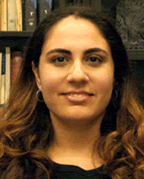Language Initiative: Cal State Fullerton Among Seven CSU Campuses to Share $1 Million
November 28, 2006
By Valerie Orleans
Beginning this summer, members of the community will have the opportunity to learn Persian through an intensive, six-week program at Cal State Fullerton.
In the planning stages for more than a year, the program is being offered as part of the California State University Strategic Language Initiative, which is designed to teach Persian, Arabic, Korean and Chinese so Americans can work more effectively with the citizens of countries where those languages are spoken.
Cal State Fullerton will take the lead in teaching Persian, also known as Farsi.
“We will offer a six-week intensive institute in Persian this summer,” said Thomas P. Klammer, dean of the College of Humanities and Social Sciences. “There will continue to be follow-up activities during the course of the year.”
The classes are tentatively scheduled to be held between June 25 and Aug. 3 with two tracks offered: One for beginners and one for “heritage” speakers, or students who already speak some Persian but are not considered fluent and may not read and write at an advanced level. Up to 15 students will be able to enroll.
The Strategic Language Initiative is a CSU system priority and seven CSU campuses will share $1 million in second-year federal funding through a U.S. Department of Defense bill that U.S. Rep. Ed Royce (R-Fullerton) sponsored for the CSU. President George W. Bush signed the bill in September.
Ghazzal Dabiri, director of the Persian Studies program at CSUF, and other instructors will be teaching the course.
“With two tracks, we can teach a great deal in an immersion-type program like this,” Dabiri said. “By the end of six weeks, beginners will be able to conduct a simple conversation, including asking for directions, the time and how to order food. They will learn how to read basic text, conjugate verbs and so on. Heritage speakers, depending on their levels, will have a better grasp of grammar, be able to read more complicated texts such as poetry, and gradually develop the ability to converse at a higher level.”
Cal State Fullerton has been offering classes in Persian for several years but the intensive course is designed for those who wish to learn a language more rapidly. Classes most likely will meet five days a week for six hours or more each day during the six-week period. The organizers hope to have residence hall rooms for students, so that they can have a true “immersion” experience.
Global situations in the past few years have highlighted the critical need for strategic and diplomatic expertise in the “strategic languages.” For that reason, the U.S. departments of Defense and State have called for collaborative efforts to fill critical shortfalls in speakers of Persian, Korean, Arabic and Chinese. The languages chosen as “strategic” are those that are critical not just for national security, diplomacy, intelligence-gathering and international business, but also for developing deeper levels of cross-cultural understanding.
“In addition to those studying the language for professional reasons, we anticipate attracting a wider audience for the six-week program,” Klammer said. “Some students may have a Persian heritage and desire to advance their abilities in the family language. Others may be interested in gaining linguistic access to literary and philosophical masterpieces written in Persian.”
Dabiri is an example of a heritage learner. “I was born and raised in the United States but spoke Persian at home,” she said. “When I was older, I began studying Persian literature and was disappointed by some of the English translations. In order to gain a better appreciation of Persian literature, which I consider deeply rich and a world treasure, I wanted to read the works in the original language.”
In addition to language, the summer institute will focus on Persian culture.
“The sessions are structured so that there will be three hours of classroom instruction, followed by three hours of what is considered passive acquisition,” Dabiri explained. “That means students will view Iranian movies or listen to dialogue. There will be some independent lab time and students will be encouraged to read Iranian text and participate in online learning programs.”
There also will be presentations from different members of the Iranian community who will discuss Persian history, culture, music and dance. And, there will be food.
“I hope to have the students meet at a different Persian restaurant once a week so they develop an appreciation of the cuisine,” Dabiri said. “I also hope to have a field trip to the Los Angeles County Museum of Art, which houses an extensive collection of Persian art.”
CSUF continues to offer a range of languages such as Spanish, French, German and Portuguese, as well as Arabic, Chinese, Korean and Vietnamese. In fact, Persian classes have been offered since 2003.
“I am hopeful that students will be interested in learning Persian,” Dabiri said. “With such close proximity to a large Iranian population in Los Angeles, as well as in Irvine, it’s a wonderful language to consider. Another consideration for studying Persian is to better understand the situation in the Middle East. If you can read and understand Persian, you can see what’s being said in the media. This gives you special insight into how Iranians view the world.”
The six-week intensive program will not be limited to Cal State Fullerton students and campus officials are working on enrollment programs for those who want to study the language without being formally admitted to the university.
The consortium of seven CSU campuses received $950,000 in first-year funding to develop the program, hire teachers and gather materials needed to offer this summer’s courses.




 Produced by the Office of Public Affairs at California State University, Fullerton.
Produced by the Office of Public Affairs at California State University, Fullerton.